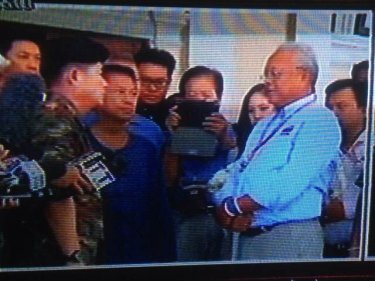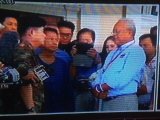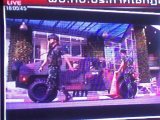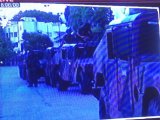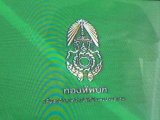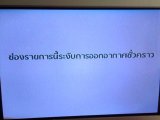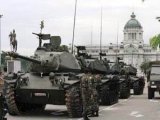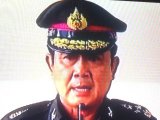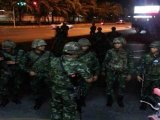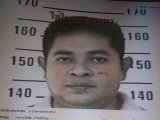PHUKET: Street protest leader Suthep Thaugsuban was quitting Government House in Bangkok today, a sure sign that the Army's intervention has not come as too much of a surprise or damaged his quest for change in Thailand.
Yet the declaration of a state of martial law triggered confusion at embassies and among tourists.
If anything, embassy warnings were strengthened with the appearance of soldiers on the streets of Bangkok - even though it seemed to be a measure guaranteed to improve safety and security.
The move came without the knowledge of the caretaker government, the remaining rump of the elected team that began to fall apart with the removal from office of Prime Minister Yingluck Shinawatra and nine Cabinet ministers earlier this month over abuses of power.
With some key supporters of Khun Yingluck's powerbroker brother, Thaksin, sidelined or out of the country at the time, some observers figured the intervention of the military would work best for street protest leader Suthep Thaugsuban and his People's Democratic Reform Committee (PDRC).
They have been striving since November to have the Shinawatras removed from politics in Thailand, and to allow a ''people's convention'' to reform the system of government before a fresh national election can be held.
Red supporters of the Shinawatras, deprived of television and radio outlets, were taking to Youtube to react this afternoon.
For better or for worse? The intervention by Thailand's armed forces was being interpreted in different ways. Here are some:
US State Department Spokesperson Jen Psaki:
''We are aware of reports that Thailand's army has declared martial law and are monitoring developments closely. We remain very concerned about the deepening political crisis in Thailand and urge all parties to respect democratic principles, including respect for freedom of speech. We understand the Royal Thai Army announced that this martial law declaration is not a coup. We expect the Army to honor its commitment to make this a temporary action to prevent violence, and to not undermine democratic institutions. The United States firmly believes all parties must work together to resolve differences through dialogue and find a way forward. This development underscores the need for elections to determine the will of the Thai people.''
EU Spokesperson from Brussels
''The EU has consistently called for dialogue, a peaceful resolution of the political crisis and respect for democratic principles in Thailand. The priority now is to set a clear timetable for early elections and establish as soon as possible a fully functioning government with democratic legitimacy. We call upon all parties to exercise restraint and work together in the interest of the country and urge the military to respect international human rights standards, including media freedom.''
Brad Adams, Director, Asia Division, Human Rights Watch:
''While there has been sporadic violence in recent months, nationwide martial law was not necessary to prevent further violence. The military has pulled a 100 year old law off the shelf that makes the civilian administration subordinate to the military, effectively rendering the executive, legislative and judicial branches powerless. The broad powers conferred on the military mean that there are no legal safeguards against rights violations and no remedies for any damage caused by the army. Censorship and shutting down of both anti-government and pro-government satellite TV channels and radio networks raises serious concerns that freedom of expression will be the first victim of de facto coup. Thailand's friends in the world's capitals should make it clear that they expect this de facto coup to be reversed immediately
''Thailand is using a century old law with draconian provisions that permit the military to exercise essentially unlimited authority to violate human rights if they are so inclined. There are basically no brakes in this law - the authorities can prohibit any activity, censor the media, outlaw meetings and assemblies, search and seize any item, hold people without trial for up to seven days, and even compel forced labor. Opportunities for justice are minimal since the law provides for the use of military courts to try cases. It's a law that pre-dates the creation of all international human rights standards, and it shows.''
Australian Government Update Advice to Citizens:
''The Australian Government has been following events in Thailand closely, and with concern. We are seeking more details on the effect of the decision of the Royal Thai Army to impose martial law. The military has said that this not a coup and the caretaker Government remains in office.
''We encourage all parties to resolve their political differences through peaceful democratic processes. Australia hopes an election in which all parties agree to participate can be held as soon as practicable. Thailand has Australia's goodwill and support as it tries to find ways to settle its political difficulties.
''The Department of Foreign Affairs and Trade today reviewed and reissued the travel advice for Thailand. Australians should familiarise themselves with this information, subscribe to receive regular updates and register their travel plans on www.smartraveller.gov.au.
''The Australian Government urges Australians travelling to Thailand to continue to exercise a high degree of caution following the imposition of martial law across the country. We urge Australians in Thailand to pay close attention to the situation as it unfolds and to be aware of their personal security. Australians in Thailand should avoid all demonstrations, political events and large scale gatherings, and follow the instructions of local authorities.
''The Government closely monitors and regularly updates all travel advisories. Australians travelling to Thailand, or elsewhere overseas, should visit www.smartraveller.gov.au.''
Yet the declaration of a state of martial law triggered confusion at embassies and among tourists.
If anything, embassy warnings were strengthened with the appearance of soldiers on the streets of Bangkok - even though it seemed to be a measure guaranteed to improve safety and security.
The move came without the knowledge of the caretaker government, the remaining rump of the elected team that began to fall apart with the removal from office of Prime Minister Yingluck Shinawatra and nine Cabinet ministers earlier this month over abuses of power.
With some key supporters of Khun Yingluck's powerbroker brother, Thaksin, sidelined or out of the country at the time, some observers figured the intervention of the military would work best for street protest leader Suthep Thaugsuban and his People's Democratic Reform Committee (PDRC).
They have been striving since November to have the Shinawatras removed from politics in Thailand, and to allow a ''people's convention'' to reform the system of government before a fresh national election can be held.
Red supporters of the Shinawatras, deprived of television and radio outlets, were taking to Youtube to react this afternoon.
For better or for worse? The intervention by Thailand's armed forces was being interpreted in different ways. Here are some:
US State Department Spokesperson Jen Psaki:
''We are aware of reports that Thailand's army has declared martial law and are monitoring developments closely. We remain very concerned about the deepening political crisis in Thailand and urge all parties to respect democratic principles, including respect for freedom of speech. We understand the Royal Thai Army announced that this martial law declaration is not a coup. We expect the Army to honor its commitment to make this a temporary action to prevent violence, and to not undermine democratic institutions. The United States firmly believes all parties must work together to resolve differences through dialogue and find a way forward. This development underscores the need for elections to determine the will of the Thai people.''
EU Spokesperson from Brussels
''The EU has consistently called for dialogue, a peaceful resolution of the political crisis and respect for democratic principles in Thailand. The priority now is to set a clear timetable for early elections and establish as soon as possible a fully functioning government with democratic legitimacy. We call upon all parties to exercise restraint and work together in the interest of the country and urge the military to respect international human rights standards, including media freedom.''
Brad Adams, Director, Asia Division, Human Rights Watch:
''While there has been sporadic violence in recent months, nationwide martial law was not necessary to prevent further violence. The military has pulled a 100 year old law off the shelf that makes the civilian administration subordinate to the military, effectively rendering the executive, legislative and judicial branches powerless. The broad powers conferred on the military mean that there are no legal safeguards against rights violations and no remedies for any damage caused by the army. Censorship and shutting down of both anti-government and pro-government satellite TV channels and radio networks raises serious concerns that freedom of expression will be the first victim of de facto coup. Thailand's friends in the world's capitals should make it clear that they expect this de facto coup to be reversed immediately
''Thailand is using a century old law with draconian provisions that permit the military to exercise essentially unlimited authority to violate human rights if they are so inclined. There are basically no brakes in this law - the authorities can prohibit any activity, censor the media, outlaw meetings and assemblies, search and seize any item, hold people without trial for up to seven days, and even compel forced labor. Opportunities for justice are minimal since the law provides for the use of military courts to try cases. It's a law that pre-dates the creation of all international human rights standards, and it shows.''
Australian Government Update Advice to Citizens:
''The Australian Government has been following events in Thailand closely, and with concern. We are seeking more details on the effect of the decision of the Royal Thai Army to impose martial law. The military has said that this not a coup and the caretaker Government remains in office.
''We encourage all parties to resolve their political differences through peaceful democratic processes. Australia hopes an election in which all parties agree to participate can be held as soon as practicable. Thailand has Australia's goodwill and support as it tries to find ways to settle its political difficulties.
''The Department of Foreign Affairs and Trade today reviewed and reissued the travel advice for Thailand. Australians should familiarise themselves with this information, subscribe to receive regular updates and register their travel plans on www.smartraveller.gov.au.
''The Australian Government urges Australians travelling to Thailand to continue to exercise a high degree of caution following the imposition of martial law across the country. We urge Australians in Thailand to pay close attention to the situation as it unfolds and to be aware of their personal security. Australians in Thailand should avoid all demonstrations, political events and large scale gatherings, and follow the instructions of local authorities.
''The Government closely monitors and regularly updates all travel advisories. Australians travelling to Thailand, or elsewhere overseas, should visit www.smartraveller.gov.au.''

